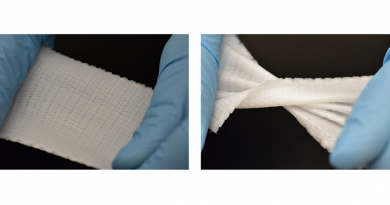Medical student-mentor teams in research: Dr. Taylor Nack and mentor Dr. Chase McNeil share their experience with SOAR
In this feature series, From the Labs met with medical students and their mentors in research. This interview highlights Dr. Taylor Nack and Dr. Chase McNeil as they share their student-mentor experiences that emerged thanks to Baylor College of Medicine’s Student Opportunities for Advancement in Research (SOAR) program and how it has shaped their careers.
Nack was a medical student while she was working with McNeil on a clinical research project. McNeil is an associate professor of pediatrics in the Division of Infectious Diseases at Baylor College of Medicine and an attending physician in pediatric infectious diseases at Texas Children’s Hospital.
Nack, a Baylor College of Medicine class of 2024 graduate, is currently a first-year general surgery resident at Baylor, on the research pathway.

From the Labs: Dr. Nack, why did you pursue research during your medical training?
Nack: My goal for medical school was to explore many different experiences, including research. This would let me know if I would want to incorporate it into my future career. The idea of contributing to a body of work that could impact patient care far beyond my own physical reach of practice is very exciting and something I think I will continue to do in my future career.
FTL: Why did you choose to work with Dr. McNeil?
Nack: I was interested in pediatrics at the time (and later shifted toward pediatric surgery). I joined the SOAR program, which has, among other opportunities for medical students, a database of research projects offered by Baylor faculty. The project Dr. McNeil listed in the SOAR database caught my interest.
FTL: What did you expect to gain from this experience?
Nack: I wanted to experience the full spectrum of the research process. I also wanted to gain insight into what it meant to be an academic physician and how that might fit into my career. I looked for a project that offered some autonomy and would push me to complete the entire research process – from idea to execution, with publication. This project and mentor were a great blend of all those goals.
FTL: Congratulations are in order! Your research was published in the Journal of the Pediatric Infectious Diseases Society. Tell us about your project.
Nack: We investigated how interventions intended to curb the SARS-CoV-2 pandemic, such as wearing a mask, correlated with invasive Group A Streptococcus (iGAS) infections. Although iGAS can affect people of all ages, these infections are more common in people older than 65 years and in infants younger than 1 year of age. We focused on the latter, as this group is considered to have a high-risk for iGAS.
We reviewed iGAS infections in infants treated at Texas Children’s Hospital from 2012 to 2022. As it was seen in other studies, we showed that during the early SARS-COV-2 pandemic iGAS infections declined significantly and then increased in the latter half of 2022. In our local study, 25% percent of cases occurred in the last quarter of 2022, and pneumonia was the most common presentation (21.8%).
Preceding respiratory virus infections are thought to be a factor in the development of iGAS. We hypothesize that efforts to curb COVID contributed to our findings. On March 24, 2020, Harris County, Texas, residents were required to wear a face covering in public and were strongly encouraged to limit public gatherings; face mask mandates were lifted statewide on March 10, 2021.
We think that a rebound in travel and social gatherings after the first years of the SARS-CoV-2 pandemic, as well as returning to school and work, may have increased the spread of iGAS as well as viruses between individuals and households.
Regarding treatment, increasing evidence suggests that many serious bacterial infections may be safely managed with early transition from intravenous to oral antibiotics once clinical improvement has been demonstrated, even among the very young. In our small cohort, we determined that, despite having serious invasive infections, most of the patients were able to be transitioned to oral antibiotics. Additional research is needed to establish the boundaries and timing for safe use of oral antibiotics in iGAS.
Our study was conducted in a single-center and included a small group of patients, limiting widespread conclusions. Nevertheless, we think that this work highlights the disease burden and clinical features of iGAS in infants during a multinational outbreak, supporting the need for further studies.
FTL: What was challenging about your research experience?
Nack: I had some experience doing clinical chart reviews but had not participated much in the analysis and writing sides. The writing process challenged me, especially the need to be succinct to convey the point, all within a limiting character count. Drawing on other writing assignments, literature reviews and academic research that we did throughout our courses at Baylor helped me with this challenge. I was also challenged by the statistical analysis. My mentor was very helpful in that regard, and I was more comfortable conducting statistical analyses on my own going forward in other projects.
FTL: How did your mentor help you navigate this experience?
Nack: Dr. McNeil was extremely helpful and responsive throughout the entire process. He made me feel like a real collaborator, rather than just a student gathering data. We spent much time going back and forth with edits, progress updates and troubleshooting like members of a team working toward making a significant impact.
The entire experience opened creative and innovative avenues for my future specialty.
FTL: What are your thoughts on the SOAR program?
Nack: I would recommend SOAR to other medical students. It was an easy and approachable way to get acquainted with mentors and the research process in general. It opened doors to projects I would not have noticed otherwise. I am very grateful for the SOAR program. I have reassessed much of my career path and interests thanks to the experience I gained here.

FTL: Dr. McNeil, tell us about your research interests.
McNeil: My work focuses on the clinical and molecular epidemiology of gram-positive disease-causing bacteria in children, particularly staphylococci and streptococci. In addition, our group examines the clinical outcomes of such infections. We investigate disease trends and address timely clinical questions through a combination of epidemiologic, microbiologic and clinical research approaches with a goal of informing clinical practice.
FTL: Why did you decide to work with SOAR students?
McNeil: During my postdoctoral infectious diseases fellowship at Baylor, my mentors ‘assigned’ me a student to aid in projects. While at the time as a fellow I felt completely unqualified to mentor anyone, I quickly learned what a mutually beneficial experience this can be. I now realize that my own mentors were trying to teach me how to be a mentor. Since then, I have always been open to working with trainees on research projects. Essentially all the faculty members who conduct research had someone at one time in their training mentoring them directly or indirectly ̶ I wanted to pay this forward.
FTL: How did you meet your Dr. Nack?
McNeil: I first learned about the SOAR program from a colleague who suggested it as an opportunity to reach a wider group of trainees. I put several postings on the SOAR website related to active areas of research in our group.
Admittedly, I was uncertain if anyone would even respond to the postings. However, Taylor responded to one of my posts within 48 hours.
FTL: What were your first impressions?
McNeil: Upon our first meeting, I was very impressed with her enthusiasm for the project. While a bit inexperienced when it came to clinical research, Taylor approached the challenge with great energy and a willingness to learn.
FTL: How do you guide your trainees?
McNeil: We set up regular meetings to check on progress and address questions. I think one of the most important things about being a mentor is having open lines of communication with trainees as well as being responsive to their questions and concerns. I try to keep an open-door policy and remember to ask them, “What can I do to help you achieve your goals?”
I involve them in all the steps of the project, from generating case report forms, database construction, data collection, analysis and finally drafting manuscripts.
FTL: What goals have you set for your trainees?
McNeil: The ultimate goal for all my trainees is to earn a publication from their work. We outlined this as a goal from the beginning and set up milestones. For example, completing human subjects research and responsible conduct of research training, creating data collection forms and creating databases with reasonable deadlines to achieve these goals.
FTL: What have been the main challenges guiding your trainees?
McNeil: One of the challenges to mentoring medical students is that they frequently have other commitments, such as rotations, course work and residency interviews. They are, after all, here to become doctors. I think it is important to understand this and be flexible and reasonable about deadlines, given these competing interests.
FTL: What are the rewards?
McNeil: This has been a very rewarding experience. In addition to these outstanding trainees helping me achieve my own research goals, I have learned from them a tremendous amount about teaching science. They are helping me grow as a faculty member.
I am learning to better anticipate challenges that they might encounter and how to better ensure they achieve their goals.
Taylor was an outstanding student and achieved a first author publication. I couldn’t be prouder of this young physician.
FTL: What are your thoughts about the SOAR program?
McNeil: I have been very impressed with the SOAR program. It allowed me to connect with extremely motivated trainees who I would not have had the opportunity to work with otherwise. I highly recommend this program to my colleagues.
FTL: Thank you both for your time!
Interested in learning more about what the SOAR program offers?
The Office of Student Opportunities for Advancement in Research (SOAR) is dedicated to educating and supporting BCM medical students in pursuing research opportunities.
For instance:
- The SOAR database helps faculty and students find matching research projects.
- SOAR provides information on how to complete the NICER attestation form, participate in scientific and medical conferences and learn from the Student Research Educational Resources.
- SOAR Travel Awards are available to support student research presentations at scientific and medical conferences.
Faculty members interested in offering this research opportunity to medical students are encouraged to submit their research projects to the SOAR database. Learn how here.
Students interested in acquiring research experience can search the SOAR database here.
For more information, email SOARoffice@bcm.edu
Follow From the Labs on X @BCMFromtheLabs and Instagram!



